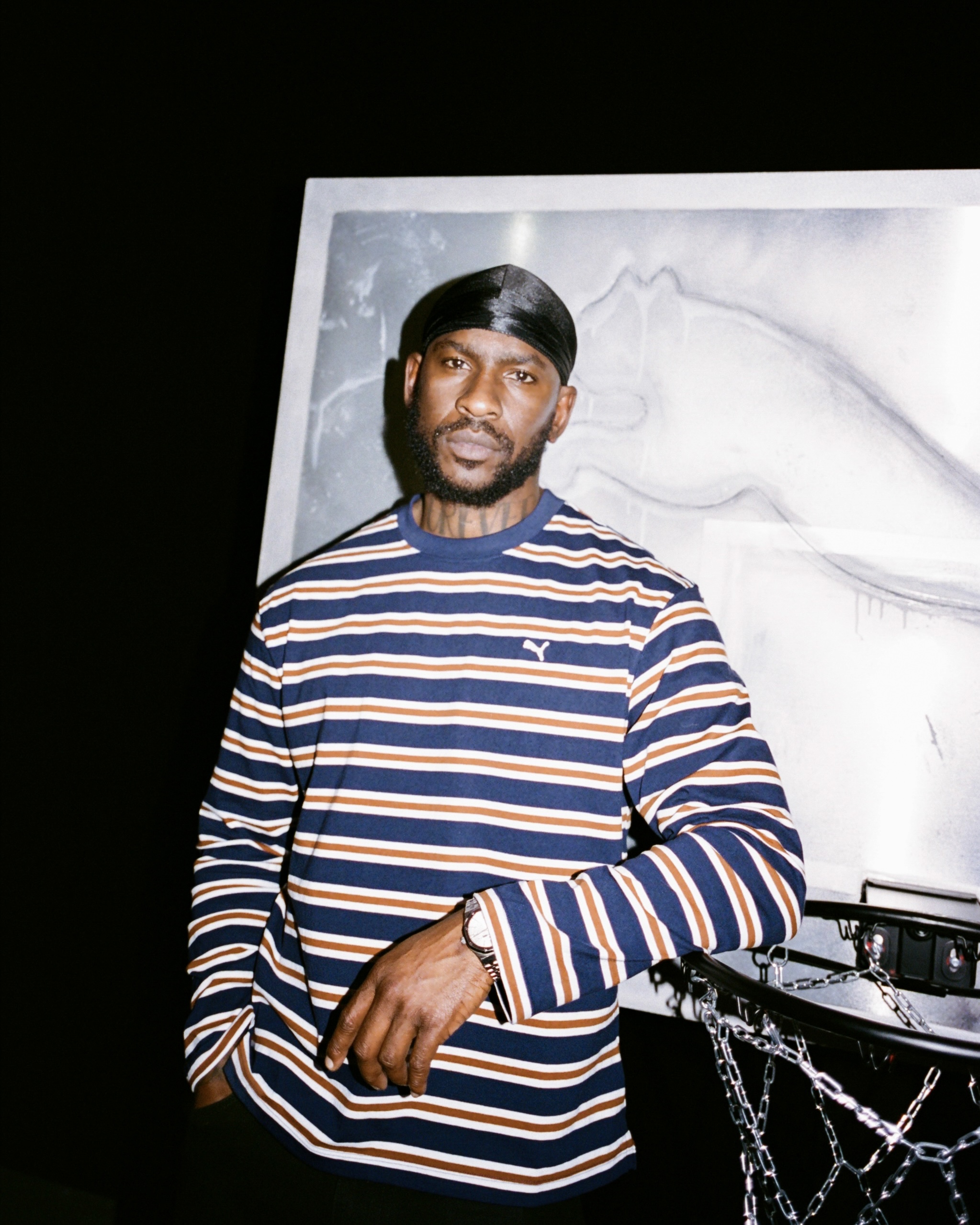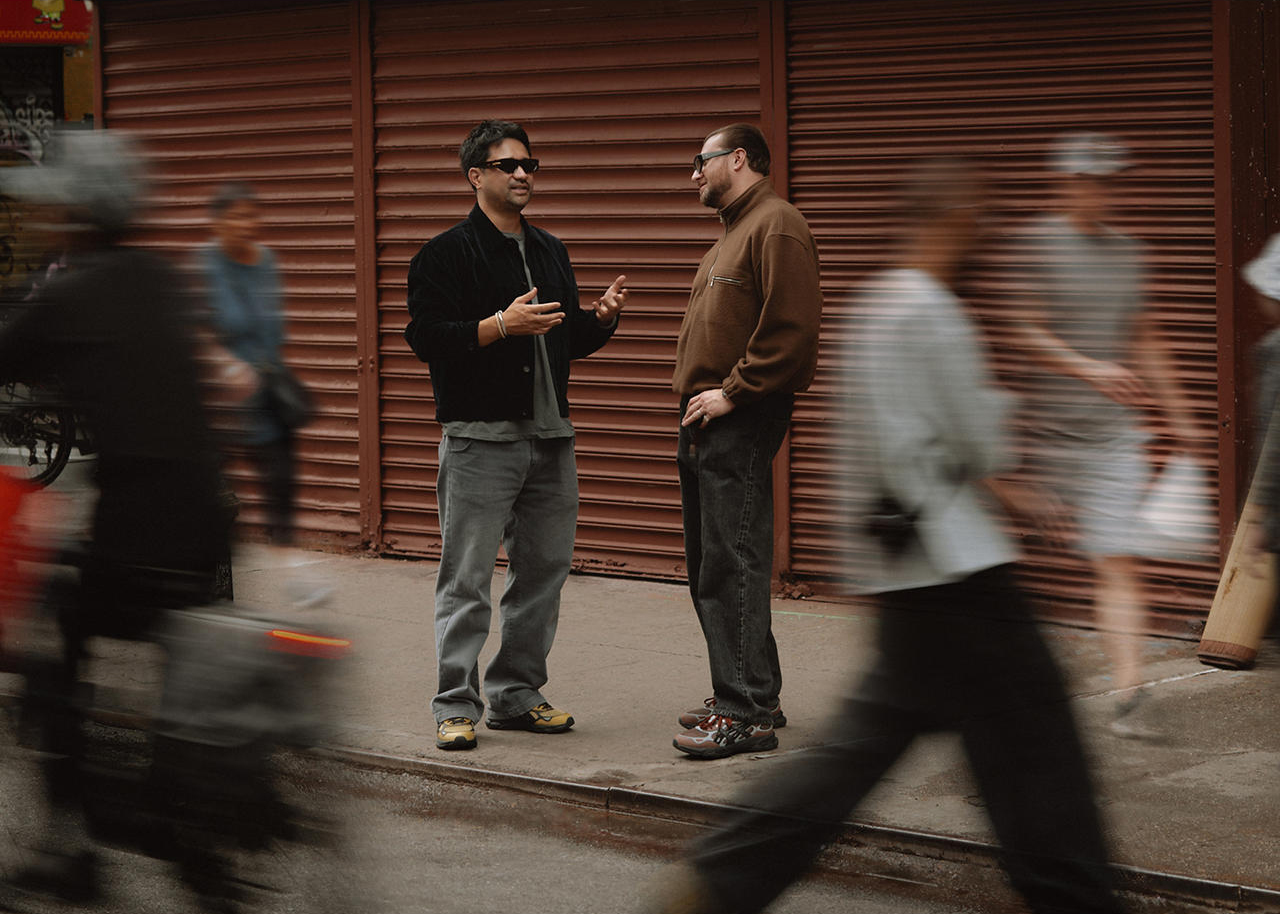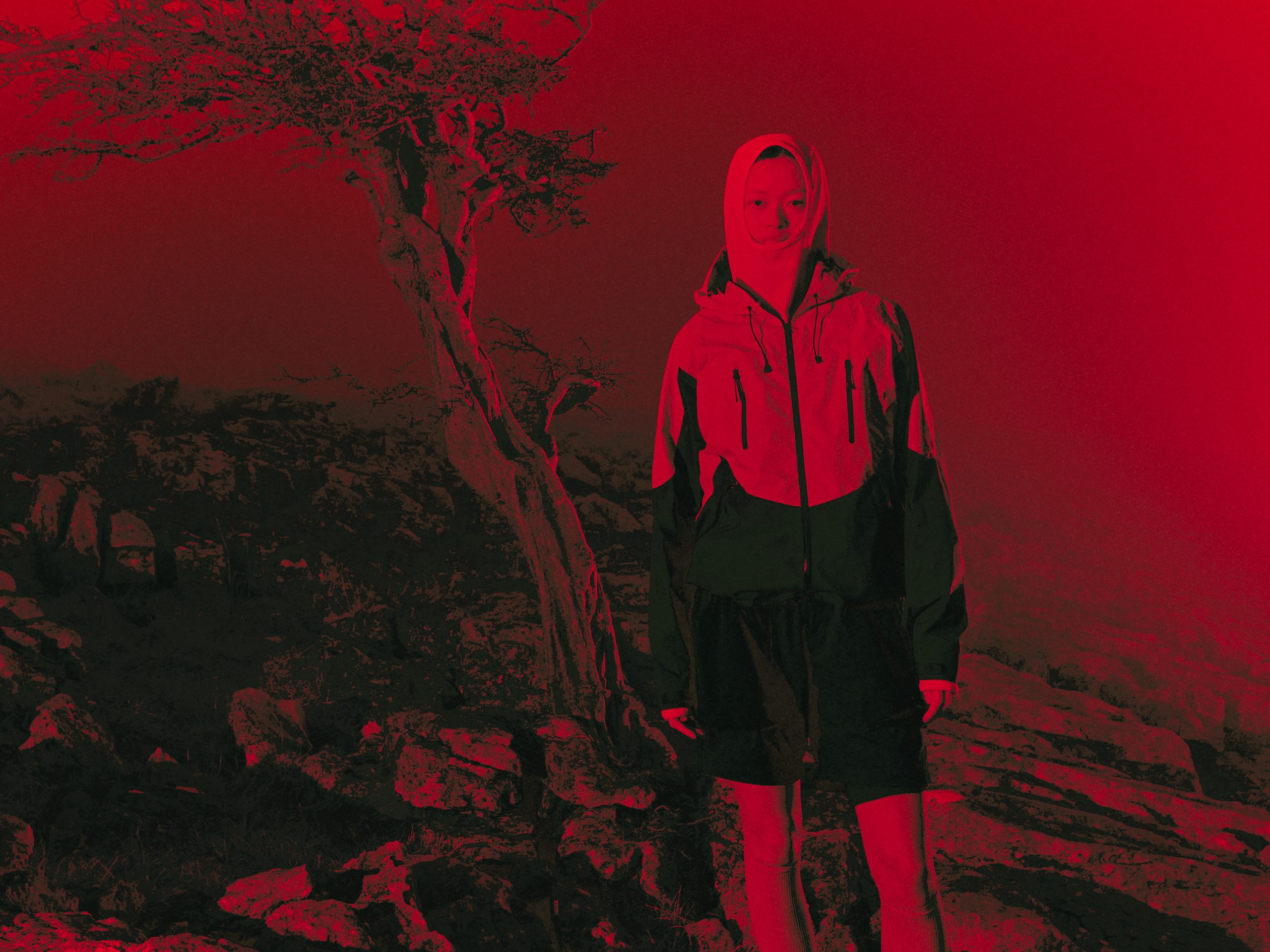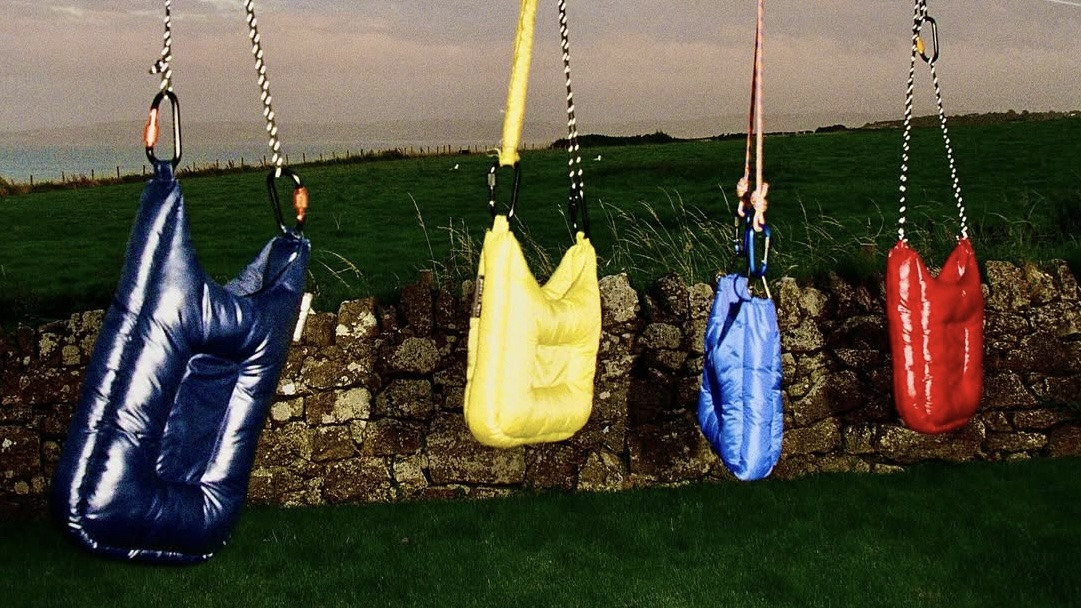As he releases his debut album, Universal Credit, the east London MC sits down with BasementApproved to discuss honesty in music, speaking from the ground not the balcony, and why he won't rap about fucking your girl.
When east London MC Jeshi first bowls through The Basement’s studio on a gloomy Thursday morning, his characteristic vim and vigour belies the fact that he’s come straight from the Eurostar after a… significantly big night in Paris, shall we say.
Perhaps I shouldn’t be surprised though, for this is an artist who always seems full of energy. Last year, he went viral for a clip of him taking a fall while trying to vault the barriers at a tube station, before it transpired that it was promo for the music video for his song ‘Sick’. Never one to colour inside the lines, the 27-year-old’s knack for spontaneity and embracing of the lo-fi liminal space between internet culture and reality has set him up as one of the most interesting up-and-coming marketers in the UK music scene right now. He would say that it’s not as manufactured as that, but that’s exactly the point. For proof, look no further than the huge Jeshi-shaped billboard just landed in Hackney Central. In a world of fame and hyper-embellishment online, he has — accidentally or otherwise — tapped into and carved out a niche in a saturated industry that allows his listeners to truly feel like he is one of them, no bells or whistles attached.
This spirit has been taken into his latest project, Universal Credit, with full force. For Jeshi and many of his generation, adolescence and early adulthood have been defined by a Tory government and all the austerity that came with it. The seeds of the full blown culture war we are witnessing today were sown in the 2010s, with media and governmental disdain for people on benefits a main character in the Cameron/Osbourne years of government, thousands of people cast away by a crumbling welfare state imbued with resentment towards our society’s most vulnerable.
All of this is lain bare in Universal Credit. Vocal snippets of Kafka-esque bureaucratic institutions referring people in need on to the next call centre seem to engulf the album in a sense of endless looping mazes, with bars like “black mould on my windows, council ain’t fixed it,” straight up relatable for many listening.
While this is very much a ‘state of the nation’ album, Jeshi doesn’t settle with commentary and criticism. Instead, the album goes one step further in solidarity with the listener, almost providing some comfort and solace through its honest depiction of shared experience. While many artists are desperate to drop flex-heavy bars designed to illustrate just how much greener grass is on their side of the mic, Jeshi does the opposite. He wants you to find similarities between your life and his. Really, though, he has no choice. This is his life we are listening to, pure and simple, and he wouldn’t want it any other way.




FLB: So I’m here with Jeshi, fresh off the Eurostar. About to release his debut album tomorrow. How you feeling bro?
Jeshi: Good man, it’s good to be here.
FLB: So, one of the things that stood out when I was listening to the album was this groundhog day-esque incessancy of life in Britain. Obviously the first song is called ‘1st of the Month for the Rest of your Life’ and it kind of sets the tone for a lot of the album. Bars like “back here again, every weekend it’s the same: one loop on replay” the samples of call centre conversations that can themselves sometimes feel like purgatory…it all adds to this sense of claustrophobia in the album, I think. Did this kind of constantness of our existence play on your mind when writing the album?
Jeshi: I think it’s something that always plays on my mind. A big part of where this album comes from is that thing of essentially not being where you want to be in life, and kind of feeling like you’re running around on a hamster wheel – running, but not really getting anywhere, that mundanity of everyday life. On the song ‘Sick’, for example, it’s that constant loop of self-destructiveness and, I guess, that fucking yourself up just because you feel like “what else do I have to do? What else is there to do?” It’s almost like a form of escapism with that shit man. .But yeah, it definitely is a big thing that goes through it.
FLB: It’s interesting that you say that, because I definitely found that, on certain parts of the album, you almost revel in that mundanity, and see it as comforting. ‘Coffee’, for example, is kind of a mini-ode to a breakfast routine, but that sense of order and sameness provides some solace rather than being this big inescapable thing. Is there a sense of that as well?
Jeshi: I think you have a duty to really present your story and your life exactly how it is. I don’t know, I think a lot of the time people think that, unless your story sounds like it’s like the Fast and the Furious, mad shit with cars flipping around and, like, guns going off everywhere, then people don’t want to hear it. But actually, I think people have undervalued the actual imagination of listeners for so long. I think what people actually want to hear is true stories, and that isn’t always the most exciting shit sometimes. That thing of life on a loop, with nothing exciting happening…that’s what people will relate to much more. I don’t know. I just have no interest in making something that pretends that my life is something it’s not.
FLB: I feel like that’s something that stands in quite stark contrast to other rappers and musicians, who almost purposely go to quite significant lengths to tell their listeners how much better their life is.
Jeshi: Yeah, it’s like, “I’m gonna fuck your bitch,” or “I have more money than you”…it’s a really weird thing. Look, people like it – I like a lot of shit like that! I think that that needs to exist, but then this also needs to exist. There’s space for all of these things, but I’m speaking from the same chair that the listener’s in, whereas a lot of the time it’s almost like they’re up on this pedestal, speaking down to the minions. That’s just not where I’m at.
FLB: Obviously a lot of the album is set against the backdrop of energy and living costs increasing drastically in the UK, but — while part of the album obviously spends time expressing what it feels like to live in Britain today — you do also really get this sense of solidarity throughout it. The bar that stood out in particular was when you said: “We all feel alone – let’s be alone together”, and I thought this notion of being alone together was quite nicely representative of what the album does with bars like bars like “trakkies Fruit of the Loom, doom, hope my payment comes soon” in ‘Hit By A Train‘, for example. It simultaneously describes things we’re all suffering from, but then provides hope in the very fact that many of us are experiencing these things, that they are as relatable as a tracksuit or a “tinny on the way home […] rizla and a fuego”. How important was it for you to have that kind of empathetic, comforting side to the album alongside the more anxiety-filled parts? Was that sense of almost solidarity with your listener something you felt important to include in the album?
Jeshi: I’m definitely glad, but it’s not an engineered thing. It’s literally just that I am in the same situation. People go to any lengths to try and act like they’re not in that situation, because it’s not ‘cool’, and everything is about being Mr. Cool Guy and Mr. Have Money. It’s not ‘cool’ to rap about being broke. But actually, to me that’s cooler! It’s much more honest.
FLB: So I guess it’s not a deliberate inclusion, more like a deliberate non-exclusion?


Jeshi: Yeah. I think it’s just like, with all of this, I want to speak about all the things that people don’t want to speak about — the things that maybe people feel ashamed of — and give power to that. It is what it is; I don’t think it’s anything to be ashamed of. It’s a phase. I don’t think any of these things aren’t temporary, and I think that amazing things can come out of these moments of vulnerability or instability. There’s good to be taken from it if you embrace it, and don’t pretend it’s something it’s not.
FLB: The other tool via which some relief is achieved throughout the album is humour and the way you deploy it, picking up on little pockets of comical niches within broadly dark moments in a way that is itself quite characteristic of Britain and British people. The album cover sets us off on this note, and bars like “daytime TV numb my brain, sick of seeing Philip Schofield anyway” and the screaming of “CUNT!” at the guy on the phone processing the claims. How important is humour to this album, do you think?
Jeshi: Really important. I think calling the album Universal Credit is so loaded and it sounds so political, but really it’s not. This ain’t some big overt statement about the world. It’s kind of just me speaking about my situation. I’m not trying to change the world. I don’t have the answers to change the world, and I’m…well, I was going to say I’m not really interested in changing the world – it would be cool to, but not right now. A lot of the time, you have to deal with your own situation before you can have some, like, Ghandi-esque view on society. So, yeah…sorry, what was the question? [laughs]
FLB: The importance of humour to the album.
Jeshi: Oh yeah. [Universal Credit] such a loaded thing, so the tone of everything is something we thought about loads. Like, how do we get this across without it feeling like preachy? I hate things that sound like that. I’m speaking from the ground and not from the balcony. I think a lot of the time people think listeners are really stupid, and you have to give everything to people on a spoon. But actually — like with the album cover for example — it doesn’t need to overtly ‘say’ anything; it says so much without ‘saying’ anything, if you get me? The image says it, but YOU have to take it away and think about exactly what it is that it’s saying. Also, people latch on to things being funny. I actually think that, if I saw something funny but also that had some real meaning behind it… that’s the best. That’s a sick double-edged sword.
FLB: It’s interesting you say the album isn’t intended to be political. Obviously you don’t have a really clear, like, “fuck the government, fuck Boris” message in there…
Jeshi: I feel like a lot of times, people just do that, and it’s not really serving any smart opinion or any depth to anything. It’s just being angry for the sake of being angry. If you’re being angry, use that anger to at least make people think a little bit.
FLB: Facts. On the other hand, though, it does feel like the way you talk about Britain in all its lack of glory at points in the album is at least kind of small-p political. You know, talking about being “scared to have kids” in ‘Generation’, bars like “15 with a rambo 35 years, how you make another kid disappear?,” and even domestic things like “black mould on my windows, council ain’t fixed it.” Do you think, even though you didn’t set out to make a ‘political’ album, the very nature of the things you discuss and the way you talk about them as an extension of just living in the UK right now is in and of itself inherently political?
Jeshi: I guess it’s more just an assessment of things around me, things I feel, things I see, things I think. But, as you said, a lot of these things just by default are political. Whether you want it to be or not, I guess it kind of is. But yeah, it wasn’t my intention.
FLB: Which arguably makes it more powerful.
Jeshi: Yeah, I think so. Because it’s real at the end of the day. I think sometimes when people try and be like, “I’m gonna give this message” and change society…you’re ain’t doing shit.
FLB: And also – who are you to tell me that?
Jeshi: Exactly!





FLB: It’s that balcony analogy again. Obviously, there is a real sense of relatability in the album, which we’ve spoken about. But I also find the way that you flip between that, and then content that’s much more autobiographical really interesting. In ‘Generation’, for example, you use drugs to paint a picture many listening will be familiar with – “Gen Z Gen sniffing ketamine off a key” – before turning on a dime and using the same theme of drugs to speak about yourself very personally: “My mum got addictions, guess I got addictions on me too. My little sister scares me sometimes – whole generation doomed.” Do you ever feel any sense of fear or hesitation about including such personal content in your music, knowing it’s gonna be listened to widely? Is it therapeutic at all?
Jeshi: I had this massive epiphany before I started making this album. Now, music is my life, and a big part of it was that I wasn’t happy with where my life was: how things were going, how much money I had, etc. A lot of time, things don’t go well for people [in music], and they tend to blame everyone else; they say fuck the label, fuck the manager, fuck this person, fuck that person. It’s everyone’s fault except for their own. But this is music. For something to work, all it means is that it’s connecting with people; people are connecting with what it is you’re doing. You can’t engineer that – you can try to, but you just can’t.
FLB: It has to come naturally.
Jeshi: Exactly. You need to make something that’s really resonating and connecting with people. I think the problem is that before — and it’s what most people do — I was putting maybe 7.8% of who I am into the music. And the music was cool; people would come up to me and say, “this is sick, I fuck with the tunes bro,” and I appreciate that. But the shift towards putting so much more of myself into it means that, now, people come up to me and tell me how much they relate to it, that they were going through this or that and how it really helped them, which to me is so much more valuable. So I really tried to dig much deeper, and give the parts of myself that you don’t always feel comfortable giving, because I think that, if I was a listener, that’s what I’d want to hear. Everyone’s story is so unique, and a lot of people don’t want to share that with people out of fear, but I think the only way to really be great is to remove all fear.
FLB: I kind of feel like the approach to the whole album generally almost necessitated your opening up personally, because it’s like, how are you going to tell me that we’re all in this together and then not talk about yourself?
Jeshi: Exactly! That’s what people don’t do a lot of time. It’s like “fuck these people and those people,” “fuck the government,” but then they don’t actually really dive into themselves. There’s no relatability because there are no stories. Details are so important. It’s why I reference, like, watching Loose Women. It’s in the specifics. I’m not going to believe a story unless you tell me the fucking details. It’s why I love that Amy Winehouse song ‘Take the Box’, where she doesn’t just say “the bra you bought me last Christmas,” it’s the Moschino bra. You know it’s true; you know it’s not just something she’s saying in the fucking song, you know he really did buy it and she’s getting rid of it.
FLB: Just like the “Fruit of the Loom trakkies” on your album.
Jeshi: Exactly. It’s so specific, you know it’s true; you can see me wearing them. I think the devil is always in the details.
FLB: So, am I right in saying that this kind of came about during lockdown.
Jeshi: Yeah, I started it in like the start of 2021. So yeah, definitely in lockdown – one of them at least.
FLB: That’s interesting. The working class have obviously long been demonised by the media and government in the UK, but I thought that contempt was completely laid bare in the difference in attitude to people who got furloughed in lockdown and those that are on Universal Credit or other benefits.
Jeshi: That’s the whole idea for the album, to be honest. Literally, that was what sparked it all. The attitudes towards people on benefits normally is like, “why don’t you just get a job? Why don’t you just get off your arse and go to work?” Being on fucking furlough is no different to Universal Credit. It’s all the same shit; the government is giving money to people who are unable to work for whatever reason, because of a situation. The problem is, it’s not just COVID; there’s a million reasons why people can’t just get up and go and work, and I think that there’s a complete lack of empathy. It’s like “well, I go to work, and I’ve done this and done that, so why can’t they do it?” I just think simplifying life like that is idiotic, because if only life was that simple.
FLB: Also, it never seems to be simplified in any sort of positive way.
Jeshi: Yeah. There’s so much nuance and grey area and everything. The reason why I put the amount they give you every month on a massive check [on the album cover] is because it’s trying to symbolise the attitude that people have towards that amount of money. £324 pounds and people talk about it as if they’ve won the lottery, like they’re living some sick life. They’re not giving you like thousands and thousands a month, you’re struggling and living a very minimal life, with no luxuries. It’s so crazy when people are like, “well, you’re on benefits, why do you get your nails done?”-
FLB: -the “if you’re really homeless, why do you have a phone?” type attitude.


Jeshi: Exactly. And it’s like, do you know what? If spending twenty quid and going to get your nails done is going to bring you some happiness, then you fucking deserve that. The whole thing was born from thinking a lot about this, and just how different the whole attitude was. With furlough it was all party party, and I’m all for that! Fucking take all the money. I think it’s great. But it can’t be like that for one thing, and not for the other.
FLB: It’s a giant double standard.
Jeshi: Nobody’s saying, you know, “how dare you, you’re taking the taxpayers money” with furlough. That’s the thing I’ve fucking hate so much. What, so if the if everyone stopped claiming benefits today, do you think they’re gonna decrease tax? No! Obviously not.
FLB: They’d just give more to their mates. They spaffed £13 billion on Test and Trace!
Jeshi: Do you know what I mean! But people are more outraged that people get a few hundred quid a month and go and get their nails done. Or have Sky. It’s mad.
FLB: I also think think that lottery theme that you have on the cover really brings to the fore this sense of how so much of it is literally about luck.
Jeshi: Life is luck! We’re lucky to be born in England-
FLB: -we’re lucky to be born.
Jeshi: Yeah, we’re lucky to be born! Think about how many degrees of luck there are. You walk down the street and you see a homeless person. That’s literally just luck, and maybe a couple of choices, decisions that anyone could make. Even when you’re on the train, and you get someone coming on and asking for money…nobody even looks at them! It pisses me off so much, it just completely dehumanises them. And it’s like, I don’t walk around with cash, I don’t give them money sometimes. But I’m going to look you in your face, and I’m going to say “I’m sorry, bro. I don’t have anything but all the best.” I think that’s the least you can do, treat people like humans. I think a lot of time it’s just a way of people dealing with their own guilt.
FLB: It’s gross. Let’s chat a little about the musical side of the album. There’s a versatility within the production to match the way it moves around thematically. A lot of minor key instrumentals kind of add to the incessant unease we discussed earlier, while more chill ones like Coffee’ and garage bops like 3210′ provide that sense of relief sonically too. How much of a hand do you have in the production of the album, and is it important that the music actually sounds like what you are talking about in the album?
Jeshi: I’m involved from the inception. It wasn’t a case of recieving a beat and doing something with it. When I’d go into the studio with people, we’d make everything from scratch together, write and make the music and have it all intertwine. For me, a big thing was that it needed to sound British in every sense. I had no interest in making some American-sounding shit. Save that for the fucking Migos. Or the Migo? I don’t know, apparently they broke up [laughs]. I don’t listen to them, that’s way out of my paygrade. But yeah, everything is equally important. It’s really it’s about creating a world.
FLB: I can kind of guess the answer to this, but is there anything you hope people feel when they listen to the album?
Jeshi: I think it’s good if people listen to it and feel that they’re not the only people in their situations.
FLB: Being alone together.
Jeshi: Yeah, “we’re all alone together.” A lot of time I think it’s just knowing that none of these things are as soul-destroying as they feel. And we’re all going through them! It passes. I think nowadays, we see everything as permanent; we want to put a label on everything, and everything has a diagnosis. I think sometimes we just go through a rough patch, man. Yes, sometimes that rough patch lasts a while, but that’s part of life. I think the sooner you accept that, the more at one with it you become.
Photography
Zeyaad Ahmed
Styling
Harriet Russell






